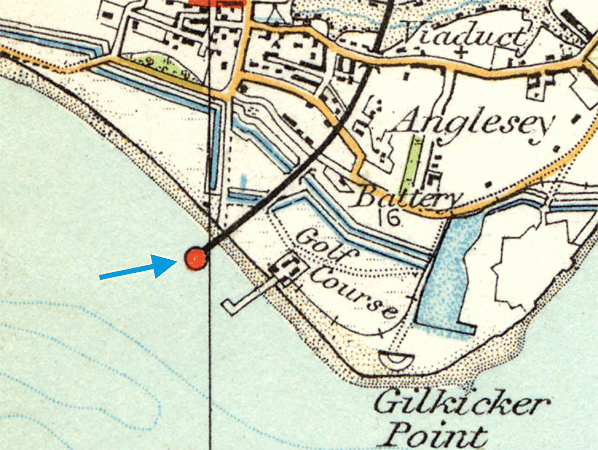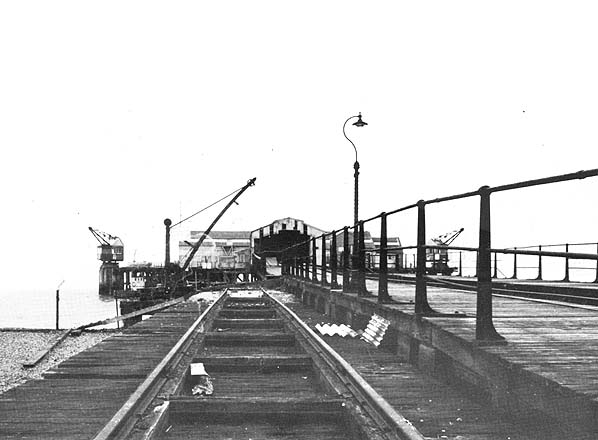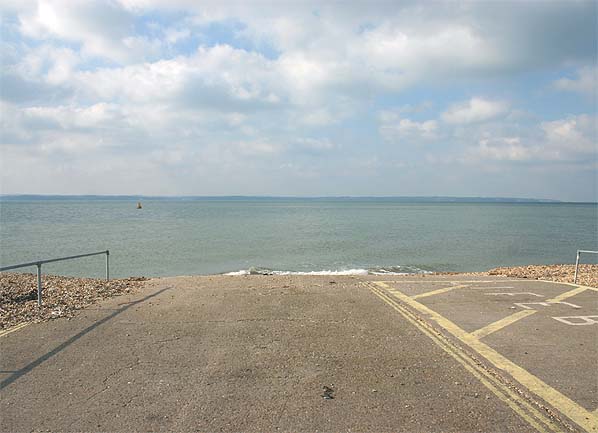|
Notes: The terminus was constructed entirely on a pier over
the sea and was primarily intended for ferry passengers to and
from the Isle of Wight.
The all weather terminal was 600' in length with two wooden
platforms and an overall roof and incorporated waiting rooms
and offices at the end of the platforms. Ramps led down either
side of the pier. The station was equipped to handle goods traffic
but was little used with only the occasional goods wagon attached
to a passenger train.
An examination of the pier supports in 1895 forced the closure
of the pier for repairs to be undertaken the following year.
During this period a temporary platform was built on land to
the north of the station.
The pier was damaged during an air attack in WW2
BRIEF HISTORY OF THE STOKES
BAY BRANCH
The first abortive scheme for a branch to Stokes Bay from the
Fareham - Gosport line (opened in 1841) was promoted in 1846
as the Gosport Pier and Branch Railway in order to cash in on
the popularity of the Isle of Wight as a holiday destination.
The proposal was resurrected in 1854 when the Stokes Bay and
Isle of Wight Railway and Pier Company promoted the construction
of 1 1/2 miles of line from a junction just west of Gosport
station to a new pier at Stokes Bay where trains would run directly
onto the pier where there would be transfer facilities for a
ferry service to a new pier at Ryde.
The LSWR refused to support the scheme and there were considerable
opposition from existing ferry operators but this was dropped
when the new company agreed to let other operators use their
pier. The Stokes Bay Railway and Pier Act were passed by parliament
on 14th August 1855.
Problems finding a suitable contractor and investors delayed
the start of construction for several years and the short branch
eventually opened on 6th April 1863. At first a reversal at
Gosport was required as the Stokes Bay branch was only accessible
from a trailing connection into the main line but a new east
curve was eventually opened on 1st June 1865 giving direct access
from Fareham; from the same date an intermediate station was
opened at Gosport Road. Initially there were five trains each
way on weekdays and two on Sundays operated by the LSWR.
Although the ferry crossing was quicker than from Portsmouth,
there were no direct trains from London so the new service was
not popular as it offered little advantage over the existing
route via Portsmouth and the LSWR resisted pressure to improve
the service to avoid conflict with the LB & SCR.
The Stokes Bay Company eventually sold out to the LSWR in 1875.
Once ownership had been transferred the LSWR were keen to improve
the service as it provided the shortest and most convenient
route to the Isle of Wight. Despite their enthusiasm, the route
was never a great success. Passenger traffic was only brisk
during the summer and in 1902 the ferry service from Strokes
Bay was suspended during winter months. The opening a new route
between Waterloo and Stokes Bay along the recently opened Meon
Valley Line in 1902 did not bring the expected increase in passenger
numbers and the new service was withdrawn in 1914.
The steamer service to the Isle of Wight was suspended at the
start of WW1 and was never reinstated. Despite the loss of the
ferry, the passenger service was still running in the summer
of 1915 but it was little used and both Stokes Bay and Gosport
road were then closed for the duration of the war taking effect
from 1st November 1915.
The pier was then taken over by the Admiralty for the transportation
of munitions and fuel. After the war the LSWR did not reopen
the line to passengers and in 1922 sold the pier and the line
south of Gosport Road station to the Admiralty who converted
the pier into a torpedo station but had no use for the railway
which was replaced by a narrow gauge line.
The track was lifted in stages and by 1930 all that remained
was the old down line as far as the Admiralty boundary south
of Gosport Road Station. This stub line was used for stock storage.
Shortly after that date the sub was cut back when Gosport Road
station was sold to the council.
Today much of the Stokes Bay branch is a public footpath although
Gosport Road Station site is now occupied by a telephone exchange
and extension to the White Hart pub car park. 'Little Anglesey
Viaduct' still bridges an inlet from Portsmouth Harbour. Stokes
Bay pier has gone with just a slipway at the end of Military
Road to indicate its former position.
Further reading: The Railways of Gosport by Kevin Robertson
- Kingfisher 1986
ISBN 0 946184 25 9 (out of print)
Branch
Lines around Gosport by Vic. Mitchell & Keith. Smith
- Middleton Press 1991
ISBN 0 906520 36 3
See also Gosport
Road & Alverstoke
|

1.jpg)



 Home Page
Home Page 




